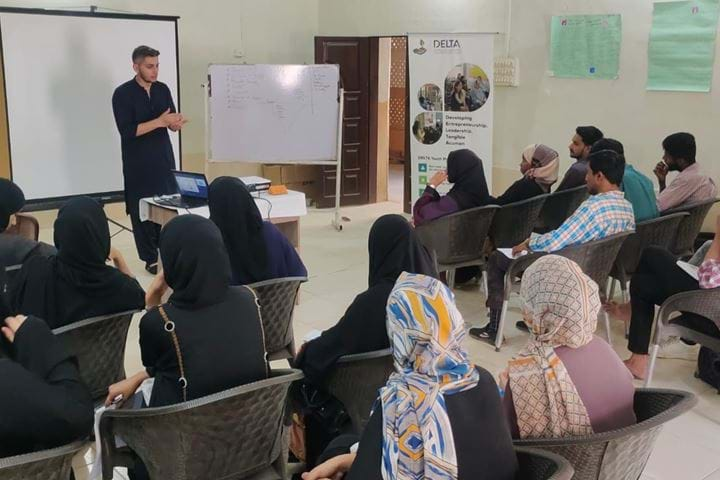Accelerating youth enterprise growth programme

Why this is important
According to the International Labour Organization, the global unemployment figure will cross 200 million people next year, with women and youth workers worst-hit. In Pakistan, unemployment among youth is augmented by illiteracy, gender discrimination, socio economic inequality and contraction in Gross Domestic Product (GDP). Furthermore, youth from marginalised communities face systemic barriers further deepened due to COVID 19. There is a lack of access in the following areas:
- Skills/Digital skills training
Youth face challenges of limited access to quality skills training, lack of interaction with industry and outdated institutional infrastructure. The pandemic also highlighted the digital divide as digital skills have become essential. The extremely low level of digital literacy presses for a systemic need to build an ecosystem for entrepreneurs with good quality, employment, entrepreneurship and digital skills training.
- Support groups/Networks for young entrepreneurs
Young entrepreneurs, especially women, need networks to actively support in strategic planning, building external alliances and are crucial sources to understand customer needs. The lack of peer networks, platforms for youth voices to be heard and socio-economic barriers hinder the rise of youth-led businesses.
- Lack of access to markets, especially for women
Additionally, the youth in Pakistan face challenges accessing markets and suffer from poor mobility options even in major cities like Karachi. Specifically for women, the lack of inaccessible and unsafe transportation hinders their economic inclusion.
While there is a recognition of the need for youth employment and its growth and stability, little has been done to address systematic barriers to mobility. This is an opportunity to engage stakeholders and the Government to present feasible solutions to increase women participation in the workforce in Pakistan.
Project Partners: Social, Entrepreneurship, and Equity Development (SEED) Ventures, Nadirshaw Eduljee Dinshaw (NED) University
Duration: 2022 - 2024
Project goals
This project is designed, in collaboration with partners SEED Ventures and NED University, to boost the employability of low-income, marginalised young people in Pakistan, particularly young women. The programme is training 200 young people aged 16-24 (60% women) to set up or grow a business, as well as create an enabling environment in which they can thrive. This project aims to involve the alumni from the previous projects as part of their cohort. Building on the work of previous projects, the British Asian Trust aims to provide digital skills post pandemic to support the recovery of enterprises (particularly those led by women) by enabling them to adopt digital technologies. This project strives to achieve the following:
- Scale and boost the employability of low-income, marginalised young people in Pakistan, particularly 60% young women
- Build platforms to enable access to networks and support for young entrepreneurs to thrive through an alumni group comprising of participants from previous and ongoing projects
- Create a platform for engagement with the youth on advising with the development and direction of current and future projects in Pakistan
- Improve access to markets, with a focus on transport mobility faced by young women through pilot test solutions to provide long term sustainable solutions, and mobility alternatives to the Government to ensure increased participation of women in the workforce.
What we are doing
The programme intends to gather alumni from across British Asian Trust programmes to engage with project participants to help them run and grow their businesses. The project also aims to address gender-based transport mobility issues in Pakistan through research that explores challenges faced by women and intends to pilot test solutions to provide long term sustainable solutions, and mobility alternatives to the Government to ensure increased participation of women in the workforce.
Through the $200,000 support by Citi Foundation, by the end of the 18-month project, the British Asian Trust will be supporting 200 micro enterprises run by youth aged 16-24 (60% women), from Lahore and Karachi. They will receive specialised training on business fundamentals, financial literacy for businesses, digital marketing, sales, customer lifetime values, and soft skills for business growth.
Key outcomes of the project include:
- 200 youth-led enterprises will increase their revenues by 15%-25%
- 200 youth employed by these enterprises increase their incomes
- 50 youth led businesses to be registered
- 50 new jobs will be created
- 500 alumni of Urban Youth Project and the Digital acceleration of Youth-led Microenterprises Project will be inducted in an alumni group for mentorship, networking support to other youth led enterprises
- Policy Research paper on actionable solutions to transport issues faced by young women
